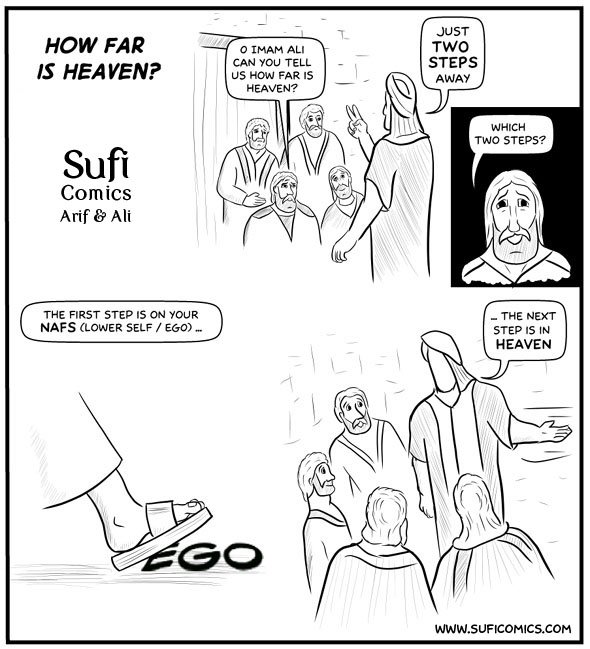[Reflection] Annihilation of the Lower Self: Barrier or Tool?

This post is by one of our readers, Maya Hussein. Inspired by spiritual readings and the Sufi Comic above, she explores the concept of the lower self and asks these vital questions: what does it mean exactly? How do you master the self? Her reflection leads to an insightful conclusion about using our bodies for a higher purpose and re-examining the actions we do to strive to reach a higher-self. I have always been fascinated by the concept of the annihilation of the lower self, or nafs. What does it mean exactly? Does it mean that we don't follow our desires when they contradict Islamic law? Does it mean that we deny ourselves all enjoyment? How far does it go?Imam Ali (a) has said many, many things about this subject among his spiritual writings, which is one of the reasons that almost every Sufi school of thought is traced back to him. The mastery of the self is a fundamental part of Islamic spirituality, and a part of every other spiritual tradition. One quote that I feel gives some perspective on the nafs is from his sermon describing the God-conscious: “He killed his nafs and enlivened his heart.” So the heart and nafs also have an inverse relationship. Feeling is enhanced when the lower self is diminished. Our senses are given to us by our Creator, but their purpose doesn't lie in their fulfillment.A profound spiritual text suggests:If we reflect in a rational manner for a moment, we shall realize that the aim of imparting to us all these graces and endowments is something else, superior to and higher than what is visible. This world is a stage of action and its aim is a higher and more sublime sphere of existence. This lower and animal existence is not an end in itself.The lower self is composed of the parts of the body, and these are only a means. Gratifying the senses for their sake alone is indulging the nafs. Using the body for a higher purpose, such as eating to maintain the body for worship, working to provide for the family, or giving charity to reduce need in the community, is overcoming the nafs.Why does “stepping” on the nafs lead to Heaven? Annihilation of the lower self is only possible when we acknowledge the purpose of life, the reason why we have bodies.“I have created the jinn and humankind only for My worship.” (Quran 51:56)Using the body solely for the purpose of worship, and all the many things that entails, is how we “step” on it. This doesn't mean that we have to deny ourselves every pleasure the world offers, but that we should examine our use of the world. For what end do we do what we do? What are we seeking? When there is no benefit to an action other than to satisfy our senses, we need to re-examine ourselves.Thomas Merton, an American monk and Christian mystic speaks distinctly on the subject:We must suffer. Our five sense are dulled by inordinate pleasure. Penance makes them keen, gives them back their natural vitality, and more. Penance clears the eye of conscience and of reason. It helps think clearly, judge sanely. It strengthens the action of our will.I have always been surprised at just how similar spiritual traditions are. Merton's words complement Islamic principles perfectly. The Christian concept of penance echoes the Islamic idea of submitting the will to the will of God. Perhaps we have different outward practices, but the internal dynamic is constant. The relationship with God is greater than the relationship with the self.Our bodies were given to us with a purpose, and our purpose with them should follow their original plan. It's how we use them that can block us from experiencing Divine Mercy.
Read and subscribe to sister Maya's blog: Children of Zahra here Do you have some insights or reflections to share on your favorite Sufi Comic &/or Sketch? Write for us here!

